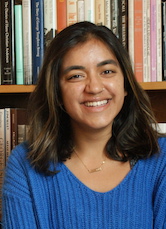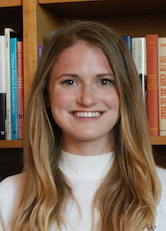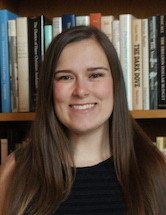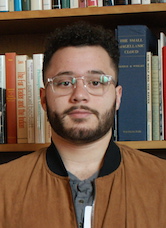2019 Winners
Upper Division Thesis
|
|
Dutton CrowleyFaculty Advisors: Charity Urbanski and Arbella Bet-Shlimon Peace for Apartheid: The Oslo Accords and Orientalism in Liberal American Foreign Policy, 1991-1996 My paper looks at the Oslo Accords, the "peace process" between the Palestinians and Israel. However, I argue that Oslo was never a peace process, and this is largely because the United States was never the neutral arbiter it purported to be. The United States sees the conflict through the lens of Orientalism, which precludes their objectivity. I ground this position in original analysis of the memoirs of two policy planners in the Clinton administration, Dennis Ross and Martin Indyk. As I show, they solely criticized the Palestinians for resorting to violence and terrorism while ignoring the expansion of Israeli settlements in the occupied territory, which are designed to extend Israeli sovereignty and render the creation of a Palestinian state implausible. I review the history of the conflict to show that this policy is antithetical to the terms of peace, specifically UN Security Council Resolution 242, which Israel nominally supports. ©Reproduction of this award project in part or in whole without permission of the author is expressly prohibited.
|
|
|
Alex Fletcher
Faculty Advisor: Rebecca Thorpe Over the last few decades, plea bargaining rates have skyrocketed in the United States. Most efforts taken by states to halt the surge of plea bargaining have not addressed prosecutorial discretion in the court, and no literature has conducted an empirical study analyzing the impact of prosecutorial handling of exculpatory evidence. I hypothesize there will be lower rates of plea bargains in states that have adopted the American Bar Association's Model Rule 3.8 (g) and (h) addressing ethical handling of exculpatory evidence. To test this, I ran a bivariate and a multivariate analysis at the county-level of 17 states, 10 with the model rule and 7 without. The existence of Model Rule 3.8 (g) and (h) has a statistically significant effect on the rate of plea bargains and there is a substantially lower predicted rate of plea bargaining within model rule states.
©Reproduction of this award project in part or in whole without permission of the author is expressly prohibited. |
|
|
Kathryn KarcherFaculty Advisor: Scott Lemieux Pursuing Social Justice: How Might a Universal Basic Income or Federal Jobs Guarantee Help Women? Welfare policies in the United States reinforce sexism, racism, and classism, and thereby oppress women. When discussing alternative policies, scholars and political players should not just consider economic consequences. They should also emphasize the social consequences of potential policies, namely how effectively they would combat women’s oppression. In this paper I consider two proposed policies, federal jobs guarantees (FJG) and universal basic income (UBI). I use the framework established in Justice and the Politics of Difference by Iris Marion Young and her explanation of the five faces of oppression to evaluate how FJG and UBI may help or harm women. I also analyze recent public opinion polling and FJG and UBI pilot programs to determine the likelihood of the U.S. implementing similar policies. This paper answers the following questions: Which policy, FJG or UBI, would more effectively lessen women’s oppression? Which is more likely to be implemented? Should those concerned with women’s oppression favor UBI, FJG, or a combination of the two? My theoretical analysis shows that UBI would more effectively combat women’s oppression, but public opinion polling and international pilot programs suggest that FJG is more likely to be implemented. This presents a dilemma for advocates who wish to prioritize vulnerable groups’ needs while focusing on realistic goals. The social justice framework I adopt in this paper helps to resolve these conflicts. Using this framework, I conclude that UBI should remain a long-term goal in our transition to a more just society because it more effectively combats women’s oppression. Still, political advocates should take seriously other policies such as FJG which still account for women’s needs and reduce harm done to them. These conclusions contribute to ongoing debate over these policies and demonstrate how researchers and advocates can analyze policies within a social justice framework that prioritizes the needs of our most vulnerable populations.
©Reproduction of this award project in part or in whole without permission of the author is expressly prohibited. |
|
|
Caroline KasmanFaculty Advisor: Melissa Knox Development Assistance for Noncommunicable Diseases: Political, Socioeconomic, and Health Indicators of Foreign Aid for an Emerging Global Crisis (paper not available) As a result of global economic development, noncommunicable diseases, also known as NCDs, have become an emerging pandemic and widescale economic burden that is not being adequately addressed. However, there is a lack of alignment between NCDs burden and funding by donor groups to low- and middle-income countries. Currently, there is limited quantitative research on how states choose to allocate foreign aid for global health issues, especially for NCDs. This report focuses on bilateral aid and models the correlations between economic, political, social, and epidemiological indicators of recipient countries and the level of DAH for NCDs given by donor countries. I predict that bilateral aid positively correlates with economic indicators such as foreign direct investment and trade openness of the recipient country. I conclude that there is evidence of political and economic ties and that donor countries may view highly democratic recipients as requiring external funding for NCDs.
©Reproduction of this award project in part or in whole without permission of the author is expressly prohibited. |
Upper Division Non-Thesis Division
|
|
Jeani AtlasFaculty Advisor: Rebecca Thorpe In the Jailhouse, Not the Statehouse: Racialized Felon Disenfranchisement and Black Descriptive Representation (paper not available) In recent decades, scholars have shown that laws restricting or eliminating the voting rights of convicted felons disproportionately prevent Black people from voting. Scholars have also found that Black voters are more likely to vote for Black political candidates than are voters of other races. However, researchers have yet to link felon disenfranchisement with political representation or access to political power. The purpose of this study is to fill this gap, analyzing how disenfranchisement laws affect Black descriptive representation in state legislatures. To do this, I employ multiple regression analysis to systematically examine whether the harshness of felon disenfranchisement laws reduces the percentage of Black state legislators in each state. While my findings show that the harshness of felon disenfranchisement laws does not meaningfully affect Black descriptive representation, the results suggest avenues for future research on whether the existence of disenfranchisement laws is itself a response to Black electoral power.
©Reproduction of this award project in part or in whole without permission of the author is expressly prohibited. |
|
|
Danielle CarrasqueroFaculty Advisor: Jordana Bailkin Civil Rights and their Limitations: On Redress for Japanese Latin Americans My research project explores the incarceration of Japanese Peruvians and Japanese Latin Americans during World War II. Further, my paper looks at the fact that these individuals were then excluded from the Civil Liberties Act of 1988. The overarching questions explored in my research are: What are the consequences of taking a civil and constitutional rights framework when considering what are actually human rights abuses? How is it that Japanese Peruvians were excluded from the Civil Liberties act, and what are the consequences of that fact?
©Reproduction of this award project in part or in whole without permission of the author is expressly prohibited. |
|
|
Kalina StorkFaculty Advisor: Jenny Stern My submission is a research paper on the ecological role of the species the Greenland shark (Sominosus microcephalus). Very few research studies have been conducted on this species, so this paper is a review on over 30 various studies that have been completed. This paper offers a comprehensive view on the Greenland shark's feeding ecology, distribution, and reproduction as well as a discussion on the potential effects climate change and increasing human activity in the Arctic could have on this species.
©Reproduction of this award project in part or in whole without permission of the author is expressly prohibited4 |
 |
Wells StrombergFaculty Advisor: Jenny Stern Benthic-pelagic decoupling and walrus responses to a warming Arctic A walrus diet typically consists of invertebrates that live on the seafloor, consumed in large quantities with the help of special morphological traits. In addition to the threats posed by diminishing sea ice in their Arctic habitat, global climate change is causing a major shift in the Pacific Arctic ecosystem and food web, reducing the food supply for the large mammals. A combination of distributional and dietary changes among Pacific walrus populations has helped them to survive so far, but the future of the species is uncertain as their ecosystem and environment continue to warm and change. ©Reproduction of this award project in part or in whole without permission of the author is expressly prohibited. |
Lower Division
|
|
Wing Yun AuFaculty Advisor: Sarah Ghasedi The Story Behind An East Asian's Name Change There’s a lot of reasons why one might decide to change their name—maybe it holds bad memories or there’s another name that holds more meaning. For a certain demographic, specifically East Asians who come to an English speaking country, the reasons begin to relate more to a connection with culture. This video explores the experiences of East Asian students who are at different relationships with their name. While some have openly adopted an English name, others have decided to continue with their ethnic name in a new country. A focus is placed on a name’s connection with family and ties with personal culture and identity. Catered to those who are experiencing the decision of whether or not to adopt an English name, the video helps present different perspectives to help with this decision.
©Reproduction of this award project in part or in whole without permission of the author is expressly prohibited. |
|
|
Sophia CareyFaculty Advisor: Michael Reagan This paper examines the ideological superstructure of the Seattle-based Youth Tutoring Program in the context of racial politics in urban design and education. Institutional restrictions to eligibility for public housing against undocumented immigrants prevent many Latinx youth from receiving adequate educational support. Such restrictions are ultimately enforced by the neoliberal ideal of a knowledge economy in which educational institutions serve to advance American dominance in the global economic framework. This ideal of a knowledge economy excludes undocumented immigrants, particularly those of Latin American descent, on the grounds of maintaining an economically self-sufficient American community in which educational and housing services are provided only to those who are presumed to have the potential to later significantly contribute to the American economy. Behind the economic-political justifications for this discrimination are racially exclusive definitions of community that play into frameworks of American exceptionalism and ideological constructions of exclusive national and local communities. ©Reproduction of this award project in part or in whole without permission of the author is expressly prohibited. |
Honorable Mention: Upper division, Thesis
|
|
Cleone AbramsFaculty Advisor: John Findlay "We Wear Our Boots Just Like the Men": Women's Roles in Pacific Northwest Mountains and Society, 1890-1939 Women challenged traditional roles and expectations in both the mountains and politics of the 20th-century Pacific Northwest. Though women continued to struggle for equality and retained separate spheres from men, they argued that their unique perspectives as women earned them more equal standing. Comparing the participants of these two activities reveals parallel elements of women’s continuing struggle for equality. Specifically, they shared common identities - only a wealthy minority were able to participate. They also had unique values and self-perceptions as women, finding satisfaction and camaraderie in both front- and backcountry spheres; at the same time many did perpetuate social biases. Finally, these women developed strategies to confront a variety of perceptions held by men in a male-dominated society. Ultimately, by World War II, women had gained social capital in the front country but continued to fight for equal status in the mountains.
©Reproduction of this award project in part or in whole without permission of the author is expressly prohibited. |
 |
Brian DangFaculty Advisor: Karen Hartman RATSKIN, Refracting and Reflecting Upon the Dispossession of Immigrant Families (project not available) Three generations of immigrant history have led up to my personhood. I’ve inherited the struggle of my mother and my grandmother before her, who have worked themselves to the bone to provide me security. This inheritance is the driving question in my research project RATSKIN, a theatrical play that is in development. How does one honor one’s immigrant history but also break free from the ideologies that were made to trap immigrants within a cycle of destruction? RATSKIN is my intervention. Incorporating literary and theatrical traditions with historical, archival research, the play is an exploration in how to weave together personal experience, genre, cultural theory, and history into a narrative that can be shared to a community in a productive, discussion generating way. The plot and construction of the story itself is an attempt to physically manifest racialization, assimilation, and the trappings of harmful ideology. ©Reproduction of this award project in part or in whole without permission of the author is expressly prohibited. |
Honorable Mention: Upper division Non-Thesis
|
|
Hannah NguyenFaculty Advisor: Robert Abrams Cyclicity in Landscape: Its Reality in Nature and Clash with Human Civilizational Progress Seeking to understand how landscape’s dualities serve as the basis for its inherently natural cyclicity in Henry David Thoreau’s Cape Cod brings us to a clearer recognition of its odds with the American ideal of unidirectional progression. The natural landscape’s discontinuous cyclicity and its connection to human civilization’s cyclical theory of history lead us to a discussion of its conceptual clash with Manifest Destiny and American exceptionalism. Thomas Cole’s Course of Empire paintings show how the landscape’s natural cycle is linked to the rise and fall of human civilizations built atop it. This paper, through analysis of Thoreau and Cole’s works, will examine how the environmental landscape’s natural cycle is irrevocably linked to that of human civilization. In doing so, we enter a more detailed discussion of how natural cyclicity in the landscape serves as a source of American fear of disruption to their nation’s ongoing progress.
©Reproduction of this award project in part or in whole without permission of the author is expressly prohibited. |
Honorable Mention: Lower Division
|
|
Delaney LawsonIncreased prevalence of human activity in the Arctic as a result of climate change, and the impacts on the Arctic ecosystem from resulting increases of introduced species Arctic sea ice levels have been steadily decreasing since the end of the 20th century, and there is no evidence of this trend disappearing in the coming years. As a result of this, shipping routes are opening up within Arctic seas, and ships have begun traversing through these waters with increasing consistency. These ships are bringing with them countless hull fouling organisms and ballast waters filled with invasive species. With increasingly temperate conditions in the Arctic, the ecosystem is becoming more and more susceptible to adverse effects of invasive species. This paper discusses specific invasive species in the Arctic, the impacts that these organisms may have on the carefully balanced Arctic ecosystem, and policies that may help combat the adverse effects of a steadily increasing prevalence of invasive species within the area.
©Reproduction of this award project in part or in whole without permission of the author is expressly prohibited. |
Population Health Award
|
|
Liam AlbrightA novel three-tiered approach to bridging the mental health treatment gap One of the most pressing issues in the world is Mental Illness. Mental illness is a large part of population health and can have large effects on society with many people experiencing it in some form or another. While mental health is a vast problem current treatment plans by States, Intergovernmental Organizations, and Non- Governmental organizations are not meeting the needs of populations around the world, particularly in low resources low-income areas. To close the treatment gap in mental health care in low resource low-income areas a novel Intervention model that combines mobile phones, Cognitive Behavioral Therapy, and Lay-Health workers should be implemented. It is certainly difficult to treat mental illnesses in rural areas and developing states due to lack of resources and infrastructure, but it is still possible with lay health workers, mobile health, and cognitive behavioral therapy combined. Lay health workers are health workers that have quick but effective training and the needed cultural and language knowledge. The mobile health platform provides an effective delivery method.
©Reproduction of this award project in part or in whole without permission of the author is expressly prohibited. |
 |
Aleenah AnsariFaculty advisor: Daniela Rosner Gentrification, Displacement, and the Question of Responsibility In 1865, Seattle’s First City Council banned Native Americans from living in the city – but restricting people’s right to a home hasn’t stopped there. Redlining, or policies that make it harder for people of color to obtain a mortgage or buy a property in certain neighborhoods, have existed in Seattle since the 20th century. The continued growth and expansion of Seattle and its skyrocketing rent prices has displaced people of color who have historically lived in the Central District. My guiding question is, “how can we use storytelling to empower the stories and experiences of the Black community in the Central District, all while acknowledging the city’s history?” ©Reproduction of this award project in part or in whole without permission of the author is expressly prohibited. |
|
|
Jazmin Moreno CandiaFaculty advisor: Beth Traxler Antibiotic Resistance and Mycobacterium tuberculosis Mycobacterium tuberculosis is highly dangerous pathogen that is very prone to multiple drug resistance. As the microbe is very slow growing, culturing methods of diagnosing antibiotic resistance can take several months, making the treatment often ineffective. Faster methods of diagnosing antibiotic resistance are being developed that will help make the treatments more accurate and tailored to the strain infecting the patient. ©Reproduction of this award project in part or in whole without permission of the author is expressly prohibited. |
|
|
Caroline KasmanFaculty Advisor: Melissa Knox Development Assistance for Noncommunicable Diseases: Political, Socioeconomic, and Health Indicators of Foreign Aid for an Emerging Global Crisis (paper not available) As a result of global economic development, noncommunicable diseases, also known as NCDs, have become an emerging pandemic and widescale economic burden that is not being adequately addressed. However, there is a lack of alignment between NCDs burden and funding by donor groups to low- and middle-income countries. Currently, there is limited quantitative research on how states choose to allocate foreign aid for global health issues, especially for NCDs. This report focuses on bilateral aid and models the correlations between economic, political, social, and epidemiological indicators of recipient countries and the level of DAH for NCDs given by donor countries. I predict that bilateral aid positively correlates with economic indicators such as foreign direct investment and trade openness of the recipient country. I conclude that there is evidence of political and economic ties and that donor countries may view highly democratic recipients as requiring external funding for NCDs.
©Reproduction of this award project in part or in whole without permission of the author is expressly prohibited. |












